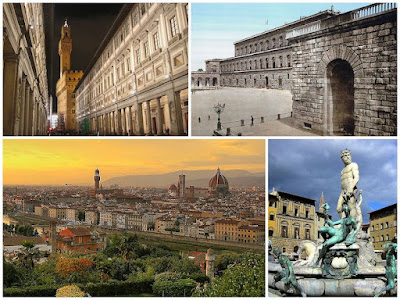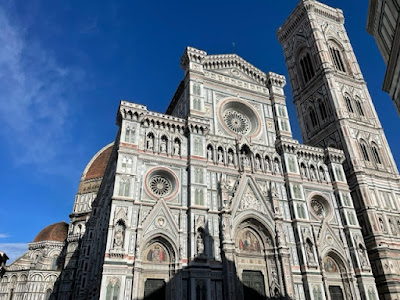John Evans had always been fascinated by history, and the city of Florence in Italy seemed the perfect vacation destination for him. He had planned his trip for months, reading every book he could find on the city and its rich cultural heritage. From the first moment his feet touched the pavement he felt he was home.
On the morning of his second day in Florence, John woke up feeling disoriented. He sat up in bed at the AirBnB he'd found two blocks from the Duomo, and rubbed his eyes, trying to shake off the grogginess. But as he looked around the room, he realized that something was very wrong. The furniture was different, the walls were made of stone, and there was no electricity. When he looked for his iPhone it wasn't anywhere to be found. In fact, he couldn't even find the outlet he'd plugged it into the night before. A chill run down his spine.
He stumbled out of bed and bolted to the window. To his amazement, he saw a bustling city street below. Instead of squads of tourists he saw the narrow street alive with people dressed in clothes from another era. His first thought was that he'd awakened somewhere in Hollywood and was on a film set. Could he actually have been transported back in time?
John was wide awake now as he went outside. He began to wander the streets while trying to make sense of his situation. As he walked, he noticed that people were staring at him, puzzled by his strange appearance and unfamiliar clothing. "Mi scusi," he said to the first few people he encountered. "Parla inglesi?"
Their replies made no sense to him. He couldn't understand the language and wished he'd been better prepared for this trip to Italy. (He'd wisely memorized a few essential words.) Each and every one spent half their time glancing up and down his attire in bafflement. A few asked where he was from but they spoke so quickly he couldn't understand a word.
Eventually, John found himself in the Piazza del Duomo where he saw a group of well-dressed men in an animated discussion. He approached them tentatively and asked for their help. To his surprise, they welcomed him warmly and offered to take him in, but he couldn't grasp what they were saying.
"No copisco," he said with a shrug, his face conveying that universal expression of confusion.
The men laughed heartily at this. One extended his hand and said, "Venire. Unisciti a noi." (That is, "Come. Join us.") The shortest of the four men made several quick commands to the others, citing one of them by name.
John couldn't believe it. "Medici?"
At this, all four stared at him, their eyebrows raised.
"Conosci i Medici?"
John suddenly realized he'd traveled back to the time of the Medicis. "Do you know Machiavelli?" he blurted out, not realizing he'd spoken in English.
The short man glared at him. "Niccolò Machiavelli?"
The American hesitated before answering.
"Sono Niccolò Machiavelli. Cosa vuoi?" (Trans. "I am Niccolò Machiavelli. What do you want?")
John bowed deeply. "I studied your book when I was in school," he said.
Their blank stares indicated he'd spoken in English again. And that's when the real remarkable thing began to happen. Words were forming in his mouth before he spoke them. In Italian! "Ho studiato il tuo libro quando ero a scuola."
The Medici turned to face his friend, placing a hand on his shoulder. "Niccolò? You've written a book?" (He said this in Italian, of course.)
Machiavelli now stared into John's eyes with suspicion. "How did you know this? No one has yet seen a word of it."
"Chiedo scusa." ( Trans. "I beg your pardon.") "One day people all over the world will be reading this book. Even in America."
"What! Did Amerigo put you up to this?"
John again looked perplexed.
"Amerigo Vespucci. He lives down by the Arno." (For those unfamiliar, the Arno is a river that runs through Florence.)
John sighed. He didn't know whether to tell them that one day two continents would be named after that man... North and South America.
Having finally realized that he had traveled back in time to the era of the Medicis, one of the most powerful and influential families in Italian history, he was prepared to accept his fate. He was amazed by the beauty and splendor of the city, with its magnificent cathedral, bustling markets, public art and vibrant energy.
Over the next few weeks, John immersed himself in this birthplace of the Renaissance, learning about their art, architecture, politics, and daily life. He heard about Booksellers Row and was given permission to handle a Greek manuscript and ancient scrolls from the time of the Greeks. He made new friends and also fell in love with a young woman named Maria who was equally fascinated by this stranger from the future who told them stories about Galileo ("He's a crazy old buzzard from Pisa," she said.) and Da Vinci and flying machines and World Wars, though he was stumped when it came to trying to describe the Internet and Social Media.
As days turned into weeks, John began to realize that he didn't want to leave this world. He believed he was home when he first arrived in Florence, but now he thoroughly felt himself to be home. After a couple months he began courting Maria and eventually, with a new sense of purpose, started a new family.
Shortly before his son was born he had an unsettling dream. Though strange in its particulars, he took it as an omen. In his heart he knew he couldn't stay here forever. Maria's love was strong, though, and when he saw the infant for the first time he wept. "Can we call him Leonardo?"
Maria said, "Sì, lo chiameremo Leonardo."
He knew that life is a miracle and a gift, but this was something he had not been prepared for.
In the end, John did find his way back to the present day. It happened like this. As he was walking with his friend Niccolò, Machiavelli began telling him that the world is more strange than he'd ever considered. "As crazy as it sounds, I'm starting to believe you're not really mad. And you'll never guess the dream I had last night."
"I'm sure I won't," Evans said. "Tell me."
"Well, it happened right over here behind this chapel."
Uncomprehending, John Evans stared down a narrow street there and realized something. He had been here before.
Niccolò clasped his hand with two hands and said, "Grazzi." The full weight of his words struck John as he realized the man was saying goodbye. Niccolò then pointed to the door.
John was overcome with a sense of foreboding. Unable to resist the pull he stepped through the door and found himself in the foyer of the AirBnB he'd rented a year before. Or rather, four centuries in the future.
Listlessly he walked up the staircase and found the room, with his iPhone still plugged into the outlet. After checking his travel pouch--yes, his passport was still there--he looked outside his window and saw a batch of tourists following a man carrying a flag who while herding them along that historic ancient path. John's eyes became moist as he thought of Maria and little Leonardo.
He never forgot his journey to the past, and the lessons he learned about love, friendship, and the enduring power of human connection. And whenever he returned to Florence, something he would do every spring for the rest of his life, he always felt a sense of nostalgia and wonder, remembering that time when he had lived among the Medicis, and felt truly alive.
* * *
In 2023, during his eighth trip to Florence to pay homage he did as he always had done, reflected on that strange chapter which seemed increasingly unreal. While in the airport in Paris Evans purchased a copy of The Atlantic to read on the plane. One of the articles was about a surprising revelation that Leonardo DeCaprio had come across while doing genealogical research.
The story began with a museum administrator who had discovered a folio of unpublished writings by Machiavelli. The author of The Prince had gone into great detail describing a man from the future named John who lived for a season with the Medicis and talked much about the future. Experts at first dismissed the papers as a hoax because they were uncannily accurate about so many things. North and South America were mentioned. So, too, were many names of famous 20th century Italians including Enrico Fermi, Mussolini, a tenor named Luciano Pavarotti and an actor named Leonardo DiCaprio.
The Atlantic reprinted one of the pages from this folio and a page from the original manuscript for The Prince to show how identical the handwriting was. By using the latest forensic technology to examine the paper and ink, a pair of scientists from Milan confirmed that not only was the paper identical but the ink as well.
The main point of the article, however, was not simply that something inexplicable had happened. The lengthy article was a story of DeCaprio's own personal quest to trace his genealogical roots. To his astonishment, he found that his family not only lived in Florence during the time of the Medicis, but that during that time he had a mother named Mary and a father named John who, according to Machiavelli's notes, said he was an American.
* * *
On the flight from Paris to Florence, Evans reflected on the incredible tale he'd just read. Then a niggling thought entered his brain. He tried to push it away but it wouldn't leave him. Evans was a writer and a researcher. In the early 1990s he had completed an incredibly detailed outline of the many branches of his family tree for his mother, brother and sisters, going all the way back to 12th century England, seeking to prove a family legend of royal roots. Despite failing in this, he found the whole process satisfying nevertheless.
In 2004 Evans heard a couple friends talking about new genetic tools that people were using to learn more about their roots. "I found out that I have German and Spanish roots that I never knew about," said one.
"I have roots that go back to Africa and a branch from the Netherlands," said another.
When John Evans got his results from Ancestry.com he learned about an Italian line he'd never uncovered before. You can guess where this is going. When he pursued his past looking for where this Italian line entered, it turned out to be a sailor during the time of Napoleon who had shipwrecked off the coast of Dover. And yes, as you've already guessed, while tracing that man's roots, John Evans learned that he was descended from himself.
* * *












No comments:
Post a Comment